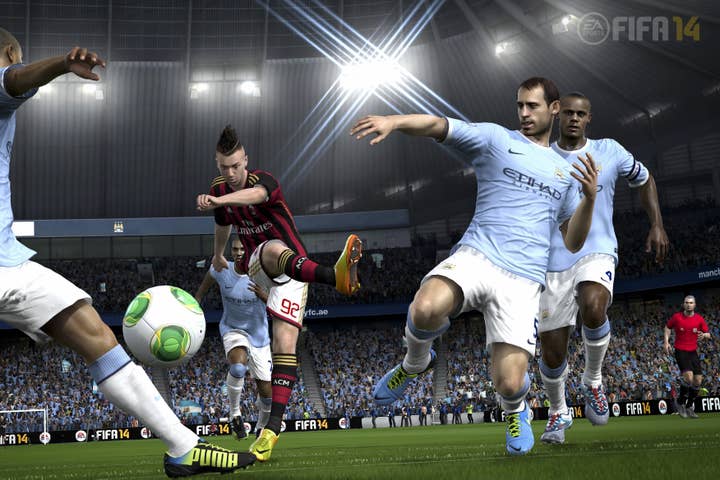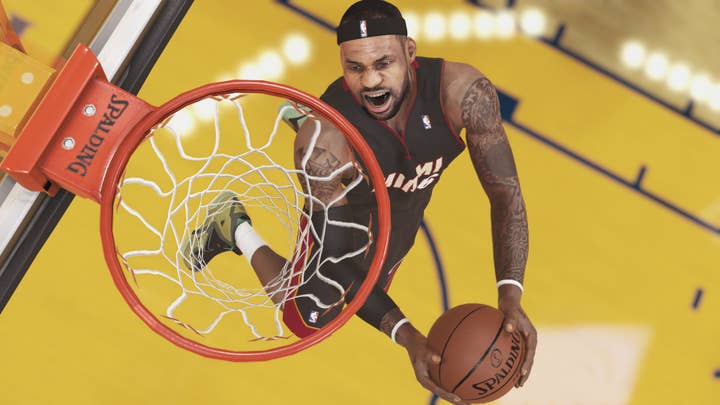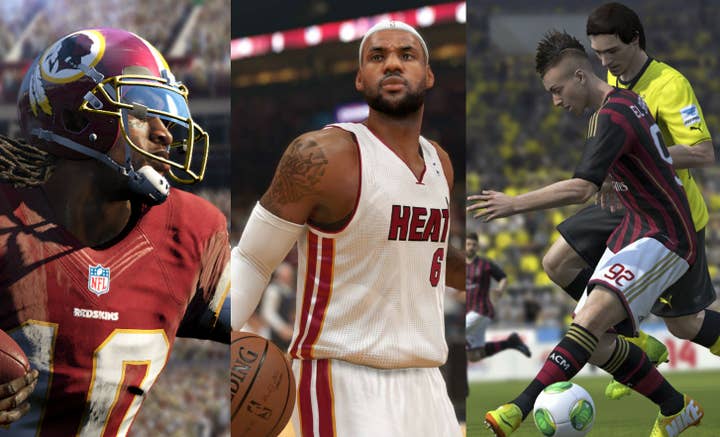Sports Games: Tackling a Catch-22
We talk with several sports franchise devs about walking the tightrope between innovation and appeasing a core fan base every year
Every year, outside of situations like EA Sports' NBA Elite, sports fans can expect to play the newest edition of their favorite franchise. To players who don't play sports games, titles like FIFA, Madden, and NBA 2K don't really change from year-to-year outside of updating rosters. For the developers though, it's a great deal of work to keep the machine moving forward annually; providing a familiar simulation experience for fans while still bringing them new innovations.
GamesIndustry International sat down with producers from a few major sports titles to dig into what it takes to keep fans happy every year. FIFA 14 producer Nick Channon, Madden 25 line producer Seann Graddy, and NBA 2K14 senior producer Rob Jones spoke to us and outlined how hard their teams work each year.
When it comes to the size of those teams, the three gentlemen differed on their answers. While Channon declined to give specific numbers, Graddy said the Madden team is "well over a hundred people," and Jones said the NBA 2K team is around 200 developers. All three agreed that it takes a huge and varied team to develop a great annual sports title.
Passion is number one. We're making a sports product, so we like to build a team that has passion for our sport.
Madden 25 line producer Seann Graddy
"What's important to acknowledge is it's not just an effort of developers, programmers, and artists - it's everybody," explained Channon. "Project managers, producers, engineers. We have a massive QA team that's spread around different locations. We have a live team that's ready to support [Madden] once it's launched. We have a database team that centrally provides all the data to make the game as authentic as possible across all our products. It's a huge undertaking to make a game the size and the scale of FIFA. Obviously to do that each year just adds to that complexity."
"It's a full-year cycle every year... we outsource a few things to give ourselves a little bit of relief. We're talking art, not engineering; everything you feel and touch, all the featuresets, are done internally," added Jones.
Graddy explained how the Madden team has branched out to other professions to make the game more authentic. EA Sports not only hired former Washington Redskins offensive tackle Clint Oldenburg to improve the offensive line in the game, but they also hired someone from NFL Films help with presentation on the digital field. Each person brings a bit more authenticity to the Madden experience, Graddy noted.
The key to keeping these sizable teams focused on the annual release is their passion for the sport. Their love of football, American football, or basketball keeps them pushing forward.
"Passion is number one," said Graddy. "We're making a sports product, so we like to build a team that has passion for our sport."

"For us, it's about having a team that's very passionate about the sport that we love," Channon added. "The games every week in the real world give us the inspiration to create new things for FIFA."
Keeping up with the annual releases requires creative planning. For franchises like Call of Duty or Assassin's Creed, this means alternating primary development teams supported by a host of other studios. In the case of sports games, the same team is developing each iteration every year. The Madden and FIFA development cycles include smaller technology teams that work on other features outside of that year's release.
"We're literally developing it every year," said Graddy about the Madden team. "We've taken an approach over recent years where we have an advanced technology team, so we can try to innovate in certain places. It's a smaller team that works ahead of the current title, with the object of getting a big innovative feature out in the following year."
"We have a backlog of things we want to do year-over-year," said FIFA's Channon. "That evolves as technology changes. In the past, we've had different features being worked on over a couple of years. We did step-based locomotion this year - our Precision Movement feature - that's been in development for a couple of years."
We don't ever feel like we've achieved [everything]. We're never appeased.
NBA 2K14 senior producer Rob Jones
For Jones and the NBA 2K team, each new game is their "best effort" for that year.
"There's a certain amount of excitement that the team has because we always feel like we didn't get to do everything we wanted to do the year before," he told us. "As we learn what that best effort is, it opens up new ideas for the following year. We don't ever feel like we've achieved [everything]. We're never appeased."
Channon told GamesIndustry International that development teams on an annual cycle get "quite good at realizing what works and what doesn't," so time isn't wasted on features that won't pan out.
"I wouldn't say we've had anything in development for a couple of years that hasn't worked. You need to be reviewing stuff along the way," he said.
"In some cases, we have a breakthrough," said Jones when it comes to certain new features. "You were doing something in 2K14, you planned on doing it a certain way, and then you suddenly have this breakthrough. You can't do it the right way in 2K14 so you shelve it, but you know you're going to do it in 2K15. It becomes a feature that carries on."
"We iterate constantly," he continued. "To the point where sometimes, just to get something right, something that was planned might slip. You might plan a feature, but you have feedback and you need to get that right. It's not right until it's right."

Part of the problem with franchises like NBA 2K, Madden, or FIFA is the avid fans who are used to playing the game in its current incarnation. Sometimes developer innovation isn't met with player enjoyment.
"You approach major changes with trepidation," warned Jones. "When you make a change you think to yourself, 'Am I alienating some guy who learned the game the year before or who's been playing it for five years?' We always take the risk if we think that it's justified."
It's a difficult tightrope to balance on: innovate too much and the fans will hate you, innovate too little and they'll get bored.
"That's been the secret of our success over the last five or six years, making sure the game still remains fundamentally FIFA," said Channon. "There's always a list of things we'd like to get to; it's just balancing when we think we should bring things like that in. We're certainly not running out of ideas."
There's always a list of things we'd like to get to; it's just balancing when we think we should bring things like that in. We're certainly not running out of ideas.
FIFA 14 line producer Nick Channon
With the last generation, having an internet-connected console became the norm for many players. For developers, this means a chance to get direct feedback on how players are playing and it allows for fixes via patches and title updates.
"In some cases with the technology that we have available now through first-party patching or even online servers, we can change the game in real-time," said Graddy. "We release multiple title updates and the actual game evolves post-production. That is often based on feedback from our fans."
"It's good for us to see what people are doing in terms of the game modes that they're playing, how they're being engaged in the game, things like that," added Channon. "Having that data really helps us make better decisions in terms of not guessing. That's something that has really helped us in the last couple of years."
But according to Jones, there's an upper limit of what can be changed via patch. Major features can't be excised from the game. What you get when you buy the game is the core of what you'll be playing that year.
"You don't iterate features over the course of NBA 2K14 when you need to make 2K15," he explained. "Internally, we've already started that turnover. From a game standpoint, 2K14 is what it is going to be. We will fix balancing issues or glaring problems that people find, but we're not introducing new stuff."
Next week, we'll continue our talk with all three producers, when our topic will shift to the challenge of developing for current and next generation consoles at the same time.

